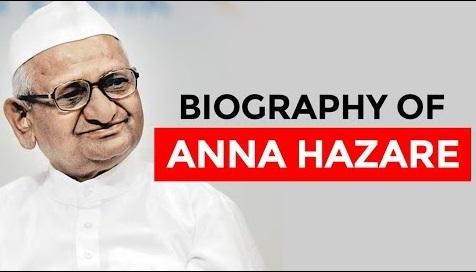Table of Contents
EARLY LIFE
- Kisan Baburao Hazare was born on 15 June 1937 (some sources say 15 January 1940) in Bhingar, near Ahmednagar.
- He was the eldest son of Baburao Hazare and Laxmi Bai. He has two sisters and four brothers. His father worked as an unskilled labourer in Ayurveda Ashram Pharmacy and struggled to support the family financially.
- n time, the family moved to their ancestral village of Ralegan Siddhi, where they owned a small amount of agricultural land
ARMY
- Hazare was drafted in the Indian Army in April 1960, where he initially worked as an army truck driver and was later attested as a soldier. He undertook army training at Aurangabad.
- He spent his spare time reading the works of Swami Vivekananda, Gandhi, and Vinoba Bhave.
- During his fifteen-year career in the army (1960–75), Anna Hazare was posted at several locations, including Punjab (Indo Pak war 1965), Nagaland, Bombay (1971) and Jammu (1974)
THE RISING
- Official records show that he was honourably discharged in 1975 after completing 12 years of service. Hazare returned to Ralegan Siddhi.
- A village then described by Satpathy and Mehta as “one of the many villages of India plagued by acute poverty, deprivation, a fragile ecosystem, neglect and hopelessness.“
- Hazare was relatively wealthy because of the gratuity from his army service. He set about using that money to restore a run-down, vandalised village temple as a focal point for the community
THE RISING
- Hazare appealed to the government of Maharashtra to pass a law whereby prohibition of alcohol would come into force in a village if 25% of the women in the village demanded it. In 2009 the state government amended the Bombay Prohibition Act, 1949 to reflect this.
- It was decided to ban the sale of tobacco, cigarettes, and beedies in the village. The youth group brought all the tobacco, cigarettes, and beedies from the shops in the village and burnt them in a Holi fire. Tobacco, cigarettes, or beedies are no longer sold.
REFORMS
- In 1980, Hazare started the Grain Bank at the temple, with the objective of providing food security to needy farmers during times of drought or crop failure. Hazare persuaded villagers to construct a watershed embankment.
- Cultivation of water-intensive crops like sugarcane was banned. Crops such as pulses, oilseeds, and certain cash crops with low water requirements replaced them.
- Hazare, along with the youth of Ralegan Siddhi, worked to increase literacy rates and education levels. In 1976 they started a preschool and a high school in 1979.
- The Gandhian philosophy on rural development considers the Gram Sabha as an important democratic institution for collective decision-making in the villages of India.
ACTIVISM
- In 1991 Hazare launched the Bhrashtachar Virodhi Jan Andolan. In 2003 corruption charges were raised by Hazare against four NCP ministers of the CongressNCP government.
- In the early 2000s Hazare led a movement in Maharashtra state which forced the state government to enact a revised Maharashtra Right to Information Act.
- In 2007 Maharashtra rolled out a grain-based liquor policy aimed to encourage production of liquor from food grain in light of the rising demand for spirits—used for industrial purposes and liquor. It issued 36 licenses for distilleries for making alcohol from food grains and he started hunger strike.
LOKPAL
- In 2011, Hazare participated in the satyagraha movement campaigning for the passing a stronger anti-corruption Lokpal (ombudsman) bill in the Indian parliament
- Known as the Jan Lokpal Bill (People’s Ombudsman Bill), this had been drafted by N. Santosh Hegde, a former justice of the Supreme Court of India and Lokayukta of Karnataka, Prashant Bhushan and Arvind Kejriwal a social activist.
- Hazare began an “indefinite fast” on 5 April 2011 at Jantar Mantar in Delhi as part of the campaign.
LOKPAL
- Protests spread to Bangalore, Mumbai, Chennai, Ahmedabad, Guwahati, Shillong, Aizawl and other cities.
- On 8 April 2011 the Government accepted the movement’s demands. On the morning of 9 April 2011 Hazare ended his 98-hour hunger strike.
- As of March 2019, and ever since the related Act of Parliament was passed in India. Retired Supreme Court judge Pinaki Chandra Ghose is appointed as the first Lokpal of India by a committee consisting of Prime Minister Narendra Modi and Chief Justice of India Ranjan Gogoi and Lok Sabha speaker Sumitra Mahajan on 23 March 2019
Biography Free PDF






















 WhatsApp
WhatsApp